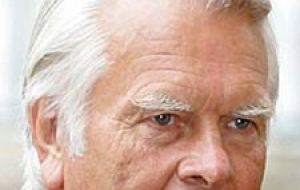MercoPress. South Atlantic News Agency
UK covered up Falklands dependency Argentine occupation
 Ex Foreign Secretary David Owen who tried to hide the occupation of Thule
Ex Foreign Secretary David Owen who tried to hide the occupation of Thule The British Foreign office actively colluded with the Argentine Junta in the late seventies to cover up the occupation of a remote Falkland Islands dependency, Southern Thule, according to The Telegraph based on newly declassified files.
The illegal scientific occupation by 50 technicians lasted until the defeat of Argentina in the Falkland Islands conflict of 1982. The article from John Bingham states that "David Owen, James Callaghan's Foreign Secretary, feared that revelations about what he accepted was a "violation of British sovereignty" on Southern Thule would derail talks between the two countries about the future control of the Falklands themselves. In diplomatic language, he described the prospect of the Islanders finding out about a large Argentine base on British territory to the south of them as a "complicating factor". Mr Owen, now Lord Owen, made clear to his Argentine counterpart, Oscar Montes, in February 1978 that Britain wished to keep the base secret lest it become an "obstacle" to resolving the long-running dispute over sovereignty. Argentine forces landed on Southern Thule - a barren, uninhabited dependency, more than 1,000 miles south of the islands - in late 1976 in a move mirroring the later occupation of South Georgia which preceded full invasion of the Falklands. They set up an illegal "scientific" base manned by up to 50 "technicians" which remained until the defeat of Argentina in 1982. Although the British Government soon knew of the incursion and quietly protested, it was kept secret until May 1978 when it was exposed by the media and eventually confirmed to Parliament. But in February of that year, as important sovereignty talks were about to get under way in Lima, Peru, a British Antarctic Survey ship, the RRS Bransfield, came across the Argentines on Southern Thule. Ministers were informed and it set in train a series of urgent messages between London and negotiators in Lima highlighting a possible plan to legitimize the base as a joint scientific station before it came to light. Officials warned the Argentines of the "danger of a leak" and urged them to agree quickly. "We were concerned that the Argentine base on Southern Thule would become public knowledge," Lord Owen told the embassy in Buenos Aires on February 17, following the three-day talks. "It was relevant that the RRS Bransfield had recently discovered the base in Thule and the crew might talk about this on their arrival in Port Stanley on February 20. "In the event of a leak … the British Government would need to make it clear publicly that they had protested to Argentina about a violation of British sovereignty. "It would be a complicating factor in our negotiations", concludes the article.




Top Comments
Disclaimer & comment rulesCommenting for this story is now closed.
If you have a Facebook account, become a fan and comment on our Facebook Page!